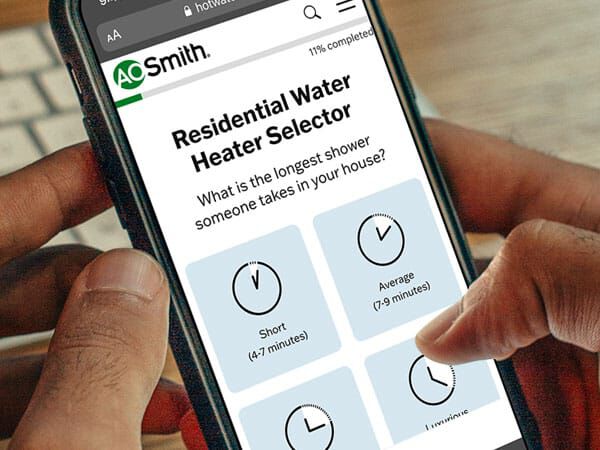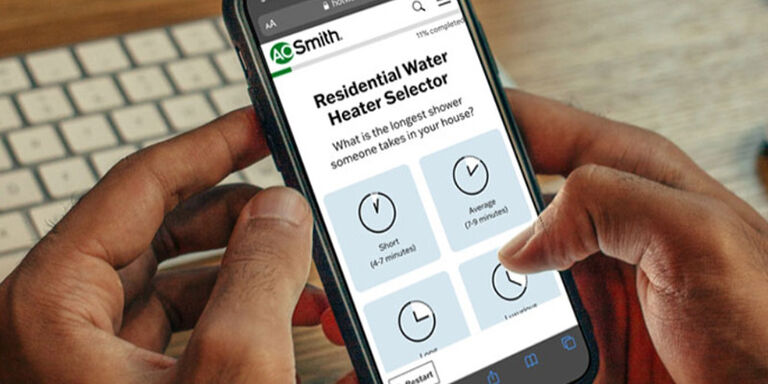
How to Decide Between Water Heater Repair or Replacement
Most people take their water heater’s reliability for granted. When issues arise, such as not having enough hot water for everyone in your household to shower, you need to know when to replace a water heater and whether it’s possible to repair it. If your water heater leaks or doesn’t heat up, you may be able to repair the existing unit. Use this article, along with your manual, to help diagnose necessary repairs and learn the signs that it’s time to replace your water heater.
How Long Do Water Heaters Last?
Based on the manufacturer's suggested service life, the average life expectancy of a water heater is about 8 to 12 years. That varies with the location and design of the unit, quality of installation, maintenance schedule and water quality. If your water heater is more than 10 years old, leaks around the base of the tank or operates erratically, it's probably time to replace your water heater. When you replace your old water heater, consider upgrading to a more energy-efficient model to cut your energy expenses. Federal tax credits and local utility rebates may be available in your area to help you with the overall cost.
Checking Your Water Heater Warranty
If you’re deciding between when to replace a water heater and when to choose water heater repair, make sure to factor in the warranty. Taking the time to thoroughly review the warranty lets you know what kind of coverage it offers for hot water heater repair or replacement costs and ensures you understand your consumer rights.
Your water heater’s warranty should also document issues that fall within the coverage, highlight specific conditions and outline any costs associated with invoking the warranty. When you have this information on hand, you can make a more informed decision as to whether you should replace your water heater or pursue water heater repair.
Knowing what to expect from the warranty also helps you better communicate with the retailer or manufacturer, improving the chances of a smooth resolution for problems covered by the warranty.
Troubleshooting Common Problems
Issues with your water heater can seriously disrupt your daily routine, but many are simple to troubleshoot and repair when you don’t want to replace your water heater. This guide helps you recognize common problems with water heaters, use troubleshooting techniques to diagnose the issues and effectively perform water heater repair — or at least point the repair person you call to correct the issues.
Not Enough Hot Water
An undersized unit may be the culprit when you don’t have enough hot water, but if it’s been working fine before now, you can typically rule this out as an underlying cause. A malfunctioning thermostat or sediment buildup inside the tank can happen over time.A failed heating element on an electric water heater can cause you to have some hot water, but not enough. Troubleshoot the issue by checking thermostat settings, and flushing the tank to remove sediment. If you still have issues after troubleshooting or calling someone for a water heater repair, consider upgrading to a larger-capacity unit.
No Hot Water
If your unit doesn’t heat water at all, check the power supply, including the pilot light if you have a gas water heater and the circuit breaker for electric models. Electric water heaters may stop heating water when they have a faulty heating element, and gas models may be experiencing problems with a dirty inlet air screen, thermopile, or the fuel supply. Check your water heater manual for the proper steps to fix these issues, or call a water heater repair professional to replace the faulty parts.
Water Too Hot
When your water is too hot, first check the temperature setting on your water heater and make changes. If your thermostat is at the correct setting a grounded heating element or stuck thermostat on an electric water heater could cause overheating. Short back to back draws of hot water on a gas water heater can cause stacking.
Water Leaks
Faulty valves, thermal expansion, loose connectors and internal tank issues are all problems that can cause water leaks within your water heater. Troubleshoot these by visually inspecting connections for signs of leaks and tighten them or change them if necessary. Internal issues may cause persistent leaks that require professional water heater repair.
Bad Heating Elements
Heating elements are the parts that heat the water, but over the average water heater lifespan, these components often corrode or wear out, causing issues like insufficient hot water — or no hot water at all! If you have a multimeter, use the device to test heating elements. If the device identifies faulty parts, drain the tank and replace the water heater elements according to manufacturer’s instructions.
Rust-Colored Water or a Bad Odor
Discolored or Smelly water is caused by hydrogen gas reacting with non harmful bacteria in the water. This happens often on well water. Increase the water heaters temperature to 140 and install thermostatic mixing valves at each point of use to prevent scalding.
Tank Noises
Strange noises coming from your water heater typically mean you have sediment buildup at the bottom of the tank. You may hear rumbling, popping or banging or even hissing or sizzling noises. Fix the issue by flushing the tank to remove the sediment inside. If you keep hearing noises after a repair, you may have a failing heating element or a cracked tank.
Water Heater Maintenance
Today’s water heaters are manufactured to require some maintenance and these tips could prolong the life of your water heater. Visit our Info Center for more maintenance tips.
- Flush the water heater at least once a year to rid it of collected sediment that causes failure. This also increases efficiency.
- Test the pressure relief valve by lifting the valve’s handle and letting it snap back into place. This should release a burst of water into the overflow drain pipe. If it doesn’t, install a new valve.
- Lower the temperature setting on the thermostat to 120 degrees Fahrenheit. If the water heater is set above 120 degrees, install thermostatic mixing valves at each point of use.
- Some gas water heaters have air screens at the bottom of the water heater that need to be cleaned. Follow the instruction manual for cleaning these screens.
Considerations When Replacing Your Water Heater
If you're replacing a water heater, you can replace it with the same type of unit. However, you might also consider upgrading to a larger tank or a more efficient water heater.
When looking for a water heater, consider these features:
- Gallon Capacity: Water heaters with 40-gallon and 50-gallon capacities usually deliver plenty of hot water for most households. Larger families and people who enjoy longer showers, however, may want a larger unit.
- Recovery Rate: The higher the recovery rate, the faster you can expect more hot water for your household needs.
- Dimensions: Consider the water heater installation space and the size you need to fit it. For instance, smaller spaces like under-counter or vanity installations may require a low-profile water heater replacement.
- Energy Efficiency Ratings: A sticker on the side should list the estimated annual cost of operating the unit and the Uniform Energy Factor (UEF). High-efficiency and ENERGY STAR® certified models can reduce costs and save energy.
Before making repairs or purchasing a new water heater, check the nameplate on the side of your current unit. Here you'll find helpful information, including the tank capacity, insulation R-value, installation guidelines, working pressure, model and serial number. If you have an electric water heater, the nameplate will also list the wattage capacity and voltage of the heating elements.
Use this information as the starting point in your search for replacement parts or a new water heater. For help choosing a water heater that best fits your household needs, check out our Water Heater Selector Tool.
Frequently Asked Questions About Water Heater Repair
What’s the typical cost for hot water heater repair?
Water heater repair costs vary based on your location, the repair company, the cost of parts and the extent of the problem. Minor water heater repairs, such as faulty thermostat or pressure relief valve replacements, usually range between $150 and $300. More involved repairs like the heating element or a malfunctioning gas valve replacement typically run higher — between $200 and $500, including parts and labor. Major issues such as leaky tank fixes or faulty heat exchanger repairs may cost you between $500 and $1,500.
What tools and materials are required to repair a water heater?
Water heater repair and replacement requires several tools — some common and some specialized. An adjustable wrench loosens and tightens connections to water supply lines and fittings, while screwdrivers remove and tighten screws on water heater panels and components. You also need a pipe wrench to loosen and tighten fittings and pipes with threading and a multimeter to perform electrical troubleshooting. Next, you need plumber’s tape to seal threaded connections and a drain pan and hose to drain the tank. Lastly, you need the replacement parts necessary for your water heater repair, such as heating elements and thermostats.
Caution
Make sure your home is equipped with carbon monoxide detectors when gas-powered appliances are present. Also, exercise caution when unloading and unwrapping your new water heater. Water heaters are heavy; use a helper, an appliance dolly and/or a hand truck when moving the appliance.

Water Heater Selector Quiz
Use our water heater selector to find the correct water heater for your home.
Why A. O. Smith?

A. O. Smith is a leading manufacturer of both residential and commercial water heating technologies, including the #1 most specified commercial water heater.

For more than 145 years, we’ve developed state-of-the art products that push new boundaries and improve the lives of our customers.

We combine cutting-edge technology with committed people who take pride in providing the very best support for our customers.

Our products are put through rigorous quality and endurance testing so no matter where hot water is needed, A. O. Smith can provide a solution you can count on.


